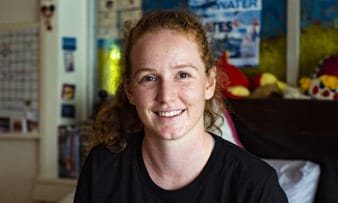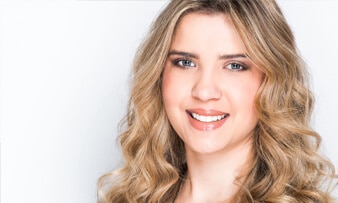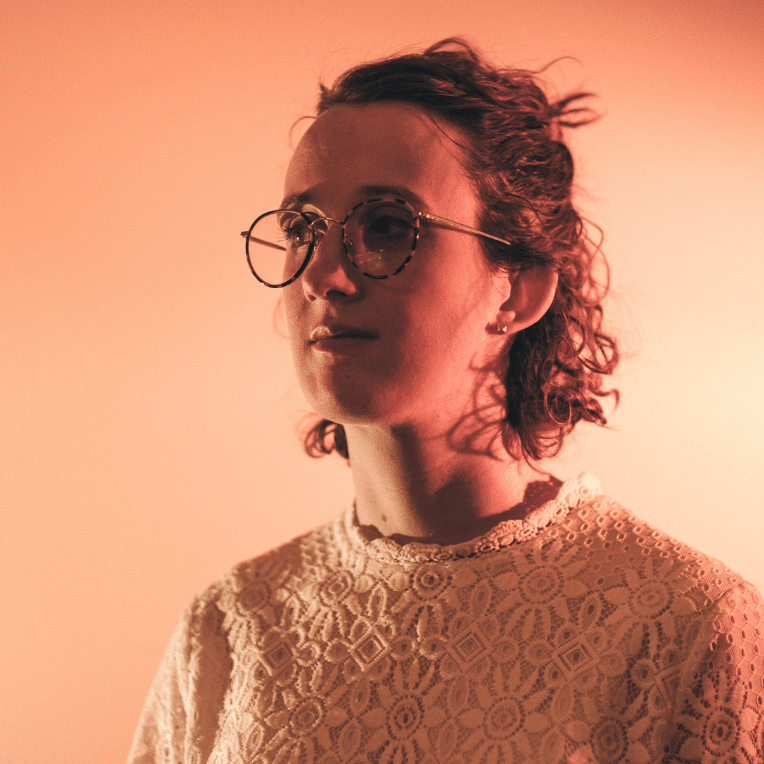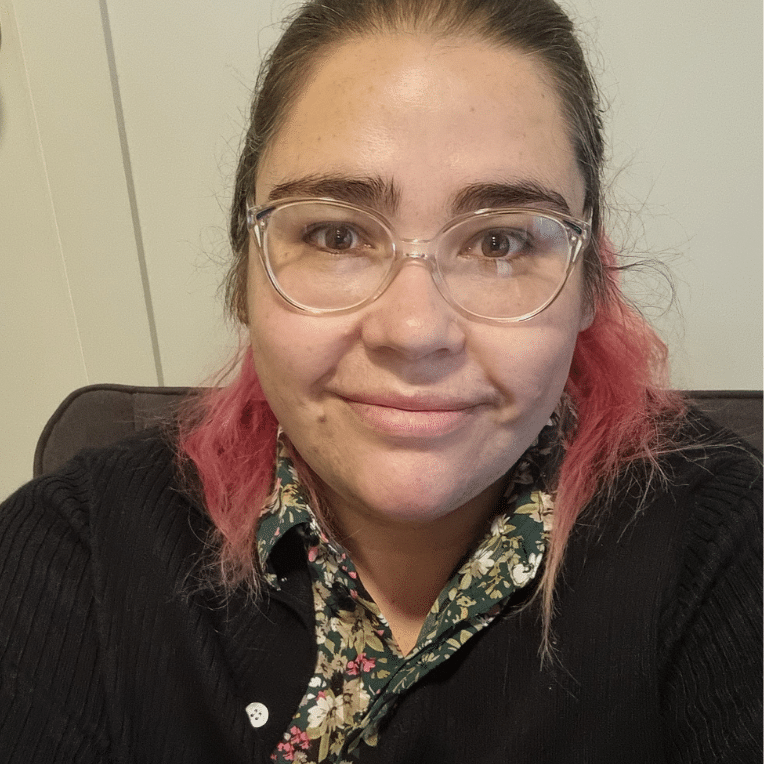Share this episode on
This episode of Grow Bold with Disability is Growing Bold and Autism Spectrum Disorder, otherwise known as ASD.
Our guest is 19-year-old Chelseann Osborne, who last year represented Australia in sailing at the Special Olympics World Games, where she won the gold medal. And her dad, Pete Osborne, also joins us. He appears alongside Chelseann in Feros Care’s Fearless Films Season Two series.
Produced by: Black Me Out Productions
Additional reading
Additional information
View transcript
Growing Bold with Autism Spectrum Disorder
Pete and Tristram: Welcome to the Grow Bold with Disability podcast brought to you by Feros Care, a podcast dedicated to smashing stereotypes and talking about the things people with disability care about most. To help us live bolder, healthier, better connected lives. I’m journalist Pete Timbs and I’m Tristram Peters. I work for Disability Service Directory, Clickability, and am a wheelchair user living with spinal muscular atrophy.
PETE: Today’s episode of Grow Bold with Disability is growing bold and Autism Spectrum Disorder, otherwise known as ASD. And our guest is 19-year-old Chelseann Osborne, who last year represented Australia in sailing at the Special Olympics World Games, where she won the gold medal. And her dad, Pete Osborne, also joins us. He also appears alongside Chelseann in Feros Care’s Season Two in the Fearless Films series.
In this episode, we’ll discover why Chelseann always thought that she was a little bit different from her friends but didn’t really know why. How her parents told her how she had ASD and how sailing has helped change her life. Chelseann and Pete, welcome to Grow Bold with disability.
CHELSEANN: Nice to be here.
PETER: Thank you.
TRISTRAM: So Chelseann let’s start with you, you say in your Fearless Film “Golden Sails”
that you always knew you had a disability. What was it that made you feel that way?
CHELSEANN: Well I knew that I required support in class because I do struggle with learning stuff and picking up new skills. So, I knew that I needed assistance in class. And I also saw a lot of therapists when I was younger, so I just pieced puzzles together. And my parents did tell me that I had a disability. They just did not say specifically what I had.
PETE: So, Pete, let us ask you. So, when did you guys noticed there was something a little bit different about Chelsea? And then how did you decide to broach the topic that she had ASD.
PETER: Well, it was pretty much from the get-go. Chelseann had a lot of trouble crawling and did not walk for a delayed period. She did not talk until she was about two and a half, maybe three. And then it was very limited speech. She could not pick up spoons and had quite a few early set issues. One of the biggest problems, it was not until high school that we finally got on ASD diagnosis. Up until then, she had been partially diagnosed with a whole heap of different things that there was not really any clear thing to work on or work towards. So yeah, it was very difficult. We just had to work problem after problem after problem to try and give her as much help as we could. So, she was going to speech when she was four. She was doing OT from three, I think. Two or three. So, there was a lot of early intervention that we put in place just to help kickstart her learning basically to do these basic things.
TRISTRAM: Yeah, absolutely. And I mean for everyone ASD manifests itself differently. For you Chelseann now, how does it present for you? How does ASD affect your day to day?
CHELSEANN: ASD predominantly affects me from what I know in my education. So, in the classroom and all of that stuff. But it’s also in big social groups and that. So, I’m still getting to grips on what it actually effects because this is all I’ve known.
PETE: Yeah, fair enough. So, Pete, let us just go back a little bit. So, what were the doctors telling you as Chelseann was growing up? What were some of the diagnosis or the misdiagnosis that we are getting?
PETER: Well, they weren’t really misdiagnosis as such. It was more, they had not at that stage up until the last few years, basically, a lot of the, um, professionals were saying that girls don’t get ASD because they present differently to boys. So, at that stage, it was boys who have ASD who present like this, this, this and this. Whereas girls show different signs apparently. It’s been a major learning curve for us. There were just random ones, but I can’t think of any of them off the top of my head now. But they were all partially on the spectrum but not enough that combined to say that she had ASD if that makes sense.
TRISTRAM: No, it does absolutely. So, when you got that official diagnosis Chelseann how did it make you feel? Was that everything clicking into place or was it just carry on as normal? How did it make you feel?
CHELSEANN: I pretty much just carried on as normal because I’ve never let my disability define me, so I just carried on its normal.
PETE: Fair enough. And Pete as a parent how do you explain to your daughter that she has ASD and what it is. And what has it meant for you guys?
PETER: With explaining it was probably more just being patient with how you’re learning things, and everybody learns at a different speed. And that not every teacher can teach to what each individual person needs. And I don’t mean just school, like, right across the board, even OTs still have to learn new techniques for different ASD people. Because everybody learns just that slight bit different. So, we just sat her down over the course of a period, we didn’t just sit down one day and say, this is it. It was more just you know “did you understand what happened”
in that that class or whatever? “No, I didn’t.”
And then we would try and alter what was what was taught to her. I had trouble at school as well, so I learned differently to the normal mainstream schooling as well. So, I’m probably on the ASD but I’m not going to bother with that. I think laterally and she thinks laterally. So, it wasn’t too bad.
TRISTRAM: Absolutely. And one of the things that I think is important tonight, but I’m in a power chair and that that is a very visible discipline, whereas ASD is an invisible disability. So Chelseann how do you go about telling people, do you feel the need to tell people about it? Do you ever have any conversations with your friends about or is it that you don’t feel the need to?
CHELSEANN: So, it very much depends on who. I do not just go around saying that I have a disability but people that I become pretty good friends with. So, one of my sailing friends know and a couple of my uni friends know. But I feel like I only tell people if I can see that it will help them. I can see that they have a kid with a disability, or they have a disability, I’ll tell them. But I kind of just keep it all on the downlow because there is still that stigma in the community about intellectual disabilities and not being able to be like fully functioning people in society. So, I do kind of keep it on the down line. But, like, I’m not ashamed of it, I do tell people, I just pick and choose who I tell.
PETE: Now let’s just go back to school. You mentioned uni there, but let’s go back to high school. So, you went to a mainstream school? How did you find mainstream school?
CHELSEANN: I quite enjoyed mainstream school. It got me in and amongst a whole group of different people that if I had gone to a disability school, I wouldn’t be able to. The hardest thing is in the town that I live in currently we only have one disability school, and they only focus on people who are heavily dependent on support. So basically, people that require support pretty much 24/7. And will require full time support for the rest of their life. So, we had that option, but at the same time, if we did choose to go down that path, it would have been very difficult to get me into the school. Whereas with the mainstream schooling, I still got the support I required in class to get my Queensland certificate of education and get into the university course I wanted.
PETE: Amazing. Well done.
TRISTRAM: Yeah congratulations. What’s the university course? What are you studying?
CHELSEANN: I’m currently studying a Bachelor of Sports Exercise Science.
PETE: Very nice. Well, let’s just talk about sport for a second here. So, Pete, you’re not just Chelseann’s dad, you’re also her sailing manager. How did you guys get into sailing like because she’s pretty good at it apparently.
PETER: Yeah. Yeah, she is.
PETE: Play it down dad, play it down. Gold medal. Hello?
PETER: I mean my family has a history of sailing. My father used to sail and we grew up involved in sailing and water skiing and a whole lot of other water sports. As I say I’ve sailed previously on yachts and on dinghies on small boats and really enjoyed it. I used to instruct on a couple of the island resorts up in the Whitsundays and teach people how to sail. So, it was pretty much a given that I liked it and then Chelseann was about nine and we were looking to put her into a sport where she could be included. But we didn’t want to go to say netball or somewhere like that where she’d be in the team, but she’d probably spend most of the time sitting on the bench being included but not really being included because her motor skills weren’t there and all that sort of thing. So yeah, her cousins from Mackay were sailing in a local regatta here in Townsville and we went down just to say good day to them and show Chelseann what they are up to and she pretty much got the sailing bug straight off the bat. She just went I’m going to do that. And yeah, I mean, she struggled with it at the start, but she’s definitely come better now.
TRISTRAM: A gold medal speaks for itself. It’s brilliant. I mean, Chelseann when you think back to that first sailing adventure that you had getting out on the water, how did you feel? What do you like about sailing?
CHELSEANN: I love the fact that I’m on the water and I want a break so I’m basically by myself. I do get this comparison a lot, it’s not as if I’m on a football team where the parents could be yelling on the field 90% of the time. My dad is like 800 plus meters away. So, it’s just me on the water.
PETE: Every teenager’s dream. Dad’s not yelling me. I love it. Where did you get the skills from, though? Do you think it’s innate in your family? Or did you spend much time on the water because it’s pretty complicated sport for the uninitiated.
CHELSEANN: Definitely time on water. And I’ve had some really good coaches throughout the year. And just learning from some of the best in Australia.
TRISTRAM: Yeah, absolutely. And I mean, Pete, Chelseann has won a ton of local, national and international sailing awards. What makes a good sailor and what makes her such a good sailor?
PETER: Well, I think one of the defining things that makes very good sailor is that she just absolutely loves it. She’s always happy to be out on the water, even like back when she was 10, her and her little brother went down and sailed in Victoria. They came back with blue lips, shivering like Little Eskimos and had an absolute ball. But yeah, coming from Townsville straight down into Port Philip Bay they were frozen. But they loved it. And I think that’s one of the main things, she’s found something that she thoroughly enjoys. So, she just keeps going hard at it and loves it. As I said, she did struggle with the actual learning of it, but I think it was her commitment to loving it that you know, we came across the Special Olympics, which gave her a lot more specialized training which definitely helped her. So I’d say to anybody listening that if you think you can do something and you’re not getting the help you need, there’s always someone somewhere who can specialize training for you.
PETE: Yeah, beautiful. It’s such a good message because also, Chelseann, you’re not just a good sailor, you’ve also become a bit of a mentor for younger kids as well. Tell us about Sailability, the program there and what you do for all the other kids. And it’s not even just that. Like you take kids swimming, you’re in taking the girl shopping. You’re a bit of a legend.
CHELSEANN: Yeah, I’m really fortunate I’ve been able to get employment for support working. So now I’m able to take young girls and teenagers to sporting events and helping their coaches out, as well as just taking them to have some girl time. And it’s a lot of fun for me because I never really had that at school. But now with the NDIS, they have the ability to have some girl time with a support worker that are not much older than most of the girls. With Sailability, it’s predominantly just taking people with disabilities out on the water and getting them to experience the water. And mentoring the kids at the sailing club. It’s so much fun, and I think I get more excited about them finishing races and finishing regattas than they do.
TRISTRAM: It’s very, very exciting. And I mean, that’s such a powerful thing that you’re supporting people who are experiencing what you’re experiencing. What does it mean to them to have that sort of person leading them and showing them what’s possible. It must mean the world to them.
CHELSEANN: I think a lot of the people that I’m with at the moment are seeing it as “she’s done it, so I can do it”
. Because there is definitely people that say like, “Oh you can’t do that because you’ve got a disability”
. But I’m coming into these kids’ lives and going “you can do it, you might just have to go step A B, C D E F G all the way up to Z instead of just going from A to Z straight away, you might have to take a couple of more steps to get to the end result.
PETE: Yeah, beautiful. Pete, Chelseann has become this great sort of mentor for all these other kids. What would you say to parents out there or even carers supporting ASD kids? What advice would you give them to enable their kids? Because you obviously were a mentor and so is your wife Karen to Chelseann. What do these kids need to live these bold lives?
PETER: Well, I’m definitely no professional, but in my thoughts, it’s apparent, one of the best things that we found to do is to find somebody with a disability is to find that one thing that they truly love and can sink their teeth right into. And, you know, all you can do is just expand their love of that one thing, keeping other things happening as well. But if they get a passion for something, really encourage it and follow it on. You know if it’s a particular sport, then work out a way they can do it more. Just don’t give up trying. If they’re struggling, just keep trying and like Chelseann said, don’t use the disability as an excuse not to try something. If you try it and if it’s not for you well, you’re still a winner because at least you’ve got out and tried something new. Just give it a go.
TRISTRAM: Absolutely. It’s such a powerful message. And I mean Chelseann you found your passion; you are excelling at sailing. We’ve mentioned that you’re studying sports science. What does the future hold for you? What do you want to accomplish in the next few years?
CHELSEANN: I’d love to finish my uni degree. And do hopefully my honors and masters, because I’d really love to work with power athletes – it’s my main goal because some of their stories just inspired me. And they just seemed to be a really good group of people from the ones I’ve met so far. Basically, my uni goals and my sailing one is to just keep sailing and see where I can get to.
PETE: Now we know you sail laser, you sail the solo ones. Would there be a Sydney to Hobart on the horizon do you think? Could you do it with a crew?
CHELSEANN: I would, but all the crews are down south. It’s a bit logistically hard living in North Queensland to join a crew for a Sydney to Hobart.
PETE: I reckon you could organize your own crew from Townsville, and you could bring a whole bunch of people down here and you could do the Sydney to Hobart. What do you reckon?
CHELSEANN: Maybe in the long future. I don’t think I’m quite old enough yet.
PETE: Good answer.
PETER: It would be good if we found somebody with a few spare million dollars to fund that dream.
PETE: Pete’s thinking of the money. Well, with the NDIS let’s see what we can do. An NDIS boat. Imagine if you won. That would be amazing.
TRISTRAM: So, Pete and Chelsea and you know that our podcast is called Grow Bold with Disability and we always ask our guests what growing bold means to you. So, Pete, let’s start with you first. What does growing bold means for you?
PETER: Well, I think I think it depends on the person because everybody is different. Look, for some, it might be just being bold and tackling those life skills to be able to you know, learn how to manage money, how to monitor what you’re eating and all that sort of just getting on with it. And others that could be success in sport like Chelseann. But you know, I think boldness really comes from the conviction to chase after what it is that makes you happy. Personally, if you can find that that one thing that makes you happy and you’ve got the conviction to chase after, then, you’re well ahead of the crowd. And don’t be afraid to ask for support because even Olympic athletes need coaching. You know, even the top people in the world still get coaching. I would like to actually steal one of Chelseann’s lines that she always has said regularly, you never know if you never give it a go and I think that’s one thing that everybody in life needs to do is just give stuff ago, because if you don’t try it, you don’t know whether you’re good at it.
PETE: Beautiful. Love it. And Chelseann what about you? What does growing bold mean to you?
CHELSEANN: I think growing bold is basically just giving everything a go and not holding anything back. It doesn’t matter who you just give it a go and you’ll never know if you are not good at it if you don’t try.
PETE: A beautiful message to get out there. Chelseann and Pete, thank you guys so much for joining us here today on the Grow Bold with Disability podcast brought to you by Feros Care. And we mentioned at the start Fearless Films Season Two, a co-production between Feros Care and Screen Works has just been launched with six short films. This series shines a spotlight on living boldly with disability. Fearless Films Season Two is out now. It’s available at Feroscare.com.au/fearlessfilmstwo and our listeners can find out more about Chelseann and Pete and all the Fearless Films in the link providing today’s show notes. Guys, that was so much fun. Thank you so much for joining us here on Grow Bold with Disability.
PETER: Our pleasure.
CHELSEANN: Thanks.
PETE: This podcast is brought to you by Feros Care, an NDIS partner delivering local area coordination services in Queensland, South Australia, and the Australia Capital Territory. Feros Care is a people care organization committed to helping people leave bolder lives. We call it growing bold and for over 30 years Feros has been making it real for both older Australians and those living with disability. To find out more head to Feroscare.com.au
View podcast disclaimer
The content and views discussed in this podcast series are those of the individuals involved. They are not necessarily condoned by, or, are the views of Feros Care or its employees.
Our Guest






